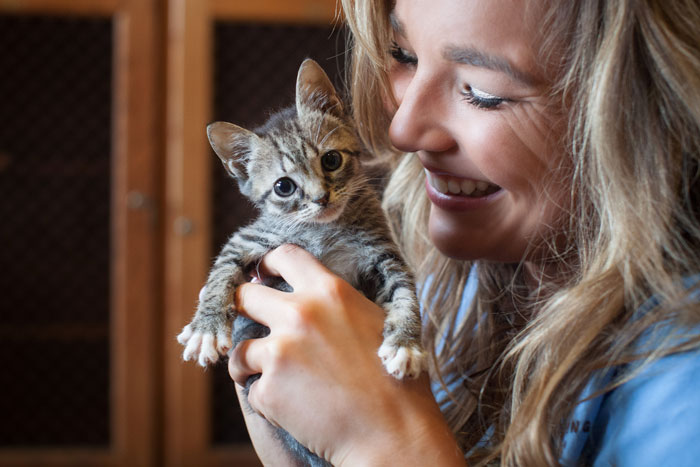Veterinary Care for A Cat

Despite becoming the most popular family pet in the United States - outnumbering dogs by roughly 5 million - cats typically receive little veterinarian care compared to their dog counterparts.
Statistically speaking, a large number of cats are seen by a vet only once every 3 to 5 years! I can certainly attest to that reality since I often find myself in a tough spot when a sick cat comes in and I notice their last wellness visit took place years ago. Unfortunately, this is a concerning issue, and I would like to address some of the reasons underlying it.
My Cat Doesn't Act Sick
To begin with, cat owners often express a misconception that cats don't need medical care, because they don't get sick as often as dogs do. In addition, most cat owners perceive their cats as independent and self-sufficient making them less prone to diseases, therefore, requiring fewer veterinary visits. Unfortunately, these beliefs are unfounded. Cats do get sick just as often as dogs, but cats are masters of disguise, so they rarely show signs of an illness until it is well-advanced. Unfortunately, waiting for your cat to exhibit signs that he/she is sick is an unwise approach, as you'll most likely end up with higher veterinary bills and fewer treatment options (if not a dead cat). All of this just to address a health issue that could have been cheaper and more successfully treated if diagnosed earlier.
Why Does My Cat Need Bloodwork?
It is not uncommon for cats to develop chronic diseases that easily go unnoticed for a couple of years by the owner. When a cat begins to show actual signs that something isn't quite right, it is because the level of health compromise has reached a point that makes it impossible for organs like the heart, kidney, pancreas, intestines, and immune system to function properly. At this point, it is of paramount importance that the client is willing to allow the vet to perform a full health screen (blood work, thyroid check, urine check, etc.) - even if the cat seems healthy. Trust me - in the end, you will save money and most likely extend your pet's life. Another advantage of a full laboratory workup is that it allows your vet to establish what is "normal" for that individual patient. This makes it easy to tell when things begin to change with age or illness. I'd like to emphasize that it is very important for cat owners to understand that cats are masterful at hiding illnesses. Cats are not pack animals so they lack the protection afforded by living in groups. It has become part of their survival instinct to "pretend" they are OK when in reality they are not.
Recommendations
 The American Association of Feline Practitioners (AAFP) and the American Animal Hospital Association (AAHA) have created an evidence-based life stage wellness program to help veterinarians in delivering the best comprehensive veterinary care for cats. According to their recommendations here is what a cat owner should do for his/her feline pal: A minimum of one annual wellness exam is highly justifiable for all cats. For the young cat, such visits allow the vet to make recommendations in regards to vaccinations and de-worming programs, address health risks related to a cat's lifestyle (indoors vs. outdoors), discuss diet recommendations, behavior, environmental enrichment, socialization, transportation, etc.
The American Association of Feline Practitioners (AAFP) and the American Animal Hospital Association (AAHA) have created an evidence-based life stage wellness program to help veterinarians in delivering the best comprehensive veterinary care for cats. According to their recommendations here is what a cat owner should do for his/her feline pal: A minimum of one annual wellness exam is highly justifiable for all cats. For the young cat, such visits allow the vet to make recommendations in regards to vaccinations and de-worming programs, address health risks related to a cat's lifestyle (indoors vs. outdoors), discuss diet recommendations, behavior, environmental enrichment, socialization, transportation, etc.
- More frequent examinations for senior or geriatric cats or cats with or without known medical and behavioral conditions are highly advisable.
- Semi-annual wellness exams are recommended for all senior and geriatric age cats.
The reasons for semi-annual exams include:
- Changes in health status may occur in a short period of time;
- Ill cats often show no signs of the disease allowing the disease to progress to a critical stage;
- Earlier detection of body weight changes (losing or gaining weight fast), dental disease, heart murmur, food and water intake, and irregular visits to the bathroom often indicate that something is wrong. Early detection allows for earlier, more effective treatments.
As cat ownership increases, cat owners need to be aware of the medical attention needed to keep their pet a healthy member of the family. It is true, most cats are independent and quite self-sufficient, however, they are also masters of disguise. Keeping them healthy will require owners to check in with a veterinarian more than once every three to five years.

